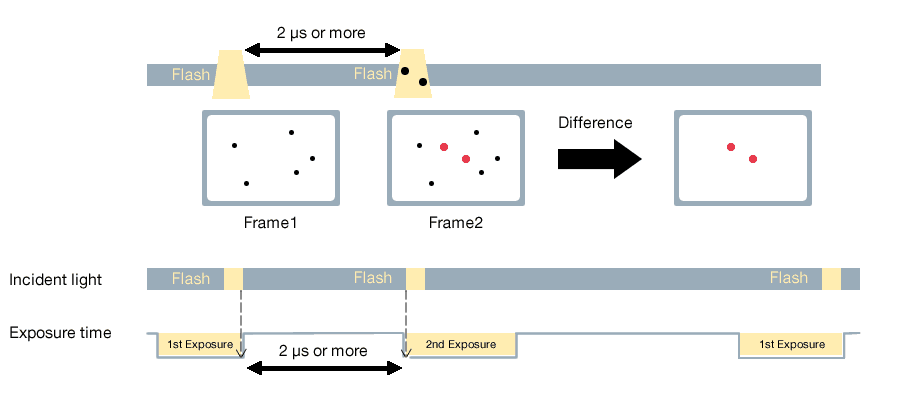- Since
- Firmware version 2.53.0
Introduction
Particle Image Velocimetry (PIV) is a non-contact optical method for determining velocity fields in fluid mechanics. Images of particles in the fluid are acquired at short time intervals. From the particle positions on the images, the direction and velocity of motion can be approximately averaged. The IMX Generation4 sensors from Sony offer a special acquisition mode for this application.
The following figure shows the schematic sequence of capturing two images and their corresponding flash signals:

Two images can be exposed at minimum 2 usec intervals.
Specifications
- activation: mvShutterMode = mvPivShutter
- free running and triggered
- trigger jitter: 1 line
- exposure time 1st image: adjustable via ExposureTime, 8 .. 255 lines (example: mvBlueCOUGAR-X with IMX547(5 MPix): 0.1 .. 2.8 ms)
- exposure time 2nd image: not adjustable: approx. readout time + exposure time 1st image (example: mvBlueCOUGAR-X with IMX547(5 MP): 25 ms + exposure time: image 1)
- interval between images: 2 us, not adjustable
Since the 2nd exposure time is much longer than the 1st exposure time, there must be little ambient light and you need a flash to get both images the same brightness. The flash can consist of 2 pulses of the same length, where the first pulse is in the exposure time of the 1st image and the 2nd pulse is in the exposure time of the 2nd image. But it can also be only one flash pulse. In this case, the first half of the flash (half of the light quantity) must expose the end of the 1st exposure time and the second half of the flash must expose the beginning of the 2nd image.
Timers of the camera can be used to generate the flash signal.
